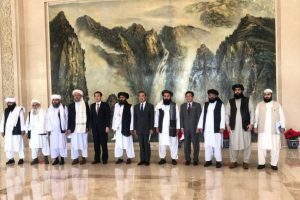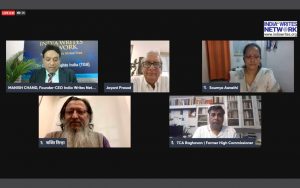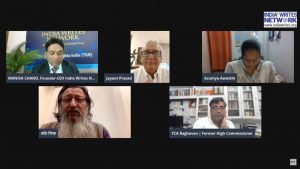
China looks set to be one of the first few countries to recognise the Taliban, and is likely to have a predominantly economic role in Afghanistan under the new dispensation, said eminent foreign policy experts and former diplomats.
Experts argued that while China, which shares 91-km long border with the war-torn country is an important player in South Asia, its importance cannot be overstated.
Although China will have a moderating influence on the Taliban, “it is unlikely to make the mistake of Russia and the United States,” said former Indian Ambassador to Afghanistan Jayant Prasad.

In Afghanistan, the Chinese have adopted a Pakistani view of the Taliban, and the future alone will reveal whether this will be a wise decision, said Mr Prasad at a webinar entitled “Taliban Takeover: What it Means for Afghanistan, India and the World.” The webinar was organised by India Writes Network and India and the World Magazine.
T. C. A. Raghavan’, former Indian High Commissioner to Pakistan, predicted that China will play a dominant economic role. “If stability returns to Afghanistan, we will see a predominantly significant Chinese economic role in Afghanistan.”
The online discussion was moderated by Manish Chand, Founder-CEO, IWN and Director. Centre for Global India Insights, a think tank focussed on geopolitics and global affairs. “A new great game has begun in the country that is often described as the graveyard of empires. Sadly, Afghanistan has become a geopolitical chessboard, with each player plotting its moves and counter-moves carefully to control the strategically-located mineral-rich country,” said Mr Chand.
Shakti Sinha, veteran Afghanistan-watcher, however, however, struck a sceptical note on whether Beijing can replace Washington in Afghanistan.
“While China is an important player in the region, I do not think it has the will, the ability or the desire to replace the United States in Afghanistan,” said veteran Afghanistan-watcher Shakti Sinha, currently serving as Honorary Director, Atal Bihari Vajpayee Institute of Policy Research and International Studies, MS University, Vadodara.
Ruling out the possibility of China putting in the kind of resources the United States had invested in the region, Mr Sinha contended that “China is in Afghanistan not for the minerals but it wants a stable Pakistan.”
“For various reasons, it feels giving a free hand to Pakistan in Afghanistan is the best way to do so.”

Publicly, China has adopted the Pakistani view in Afghanistan, but China also has its concerns about the impact of the Taliban rule on peace in the region. The Taliban has been built by several Islamist militant groups including the Al Qaida, Lashkar-e-Taiba, Hizbul Mujahideen and the Turkistan Islamic Movement (TIM) formerly known as the East Turkistan Islamic Movement (ETIM). TIM is fighting for the independence of the strategically significant Xinjiang province in China, which is home to 10 million Uygur Muslims, and the creation of an autonomous ‘East Turkestan’ out of it.
China has apprehensions that the Taliban takeover will embolden TIM militants to destabilise Xinjiang. In a bid to check TIM, Beijing has courted the Taliban itself since it does not want Afghanistan to become a hub for alleged Uyghur militants who could pose a threat to China’s internal security.
In his meeting with Chinese Foreign Minister Wang Yi in Tianjin in July this year, Taliban co-founder Mullah Abdul Ghani Baradar assured his group would not allow Uyghurs to use Afghanistan to threaten China. Besides Afghanistan, Xinjiang shares its borders with Pakistan Occupied Kashmir besides Kazakhstan, Kyrgystan and Tajikistan.
China, which was happy with the pullout of American troops in Afghanistan and had quickly embraced Taliban, following the fall of Kabul has been sending out positive signals. China has conveyed that it is “ready to develop, good neighbourliness and friendly cooperation with Afghanistan” has gradually toned back its rhetoric and is now adopting a more cautious approach.
(Vinati Bhargava Mittal contributed inputs for this article)
Author Profile
- India Writes Network (www.indiawrites.org) is an emerging think tank and a media-publishing company focused on international affairs & the India Story. Centre for Global India Insights is the research arm of India Writes Network. To subscribe to India and the World, write to editor@indiawrites.org. A venture of TGII Media Private Limited, a leading media, publishing and consultancy company, IWN has carved a niche for balanced and exhaustive reporting and analysis of international affairs. Eminent personalities, politicians, diplomats, authors, strategy gurus and news-makers have contributed to India Writes Network, as also “India and the World,” a magazine focused on global affairs.
Latest entries
 DiplomacyJanuary 5, 2026India walks diplomatic tightrope over US operation in Venezuela
DiplomacyJanuary 5, 2026India walks diplomatic tightrope over US operation in Venezuela India and the WorldNovember 26, 2025G20@20: Africa’s Moment – The Once and Future World Order
India and the WorldNovember 26, 2025G20@20: Africa’s Moment – The Once and Future World Order DiplomacyOctober 4, 2025UNGA Resolution 2758 Must Not Be Distorted, One-China Principle Brooks No Challenge
DiplomacyOctober 4, 2025UNGA Resolution 2758 Must Not Be Distorted, One-China Principle Brooks No Challenge India and the WorldJuly 26, 2025MPs, diplomats laud Operation Sindoor, call for national unity to combat Pakistan-sponsored terror
India and the WorldJuly 26, 2025MPs, diplomats laud Operation Sindoor, call for national unity to combat Pakistan-sponsored terror







